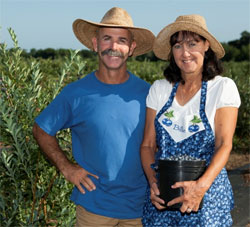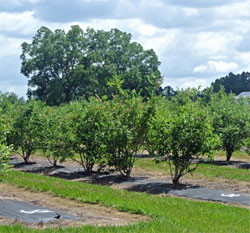Sustainable Farming Works at Rooney's Suwannee County Blueberry Farm
Gov't. programs give a helping hand
Posted June 3, 2015 04:30 am
 LIVE
OAK,
FL - In 2005, Scott and Billie Rooney bought the first
53 acres of their now 80-acre farm in Suwannee County,
east of Live Oak. Ten years later, the Rooney farm
is divided into six acres of four varieties of “Rabbiteye”
U-pick blueberries, a quarter of an acre of one variety
of U-pick blackberries, 25 acres of fenced-in, pasture
land for their sheep and a few cattle, and five acres of
long leaf pine trees which are beneficial to the natural
habitat.
LIVE
OAK,
FL - In 2005, Scott and Billie Rooney bought the first
53 acres of their now 80-acre farm in Suwannee County,
east of Live Oak. Ten years later, the Rooney farm
is divided into six acres of four varieties of “Rabbiteye”
U-pick blueberries, a quarter of an acre of one variety
of U-pick blackberries, 25 acres of fenced-in, pasture
land for their sheep and a few cattle, and five acres of
long leaf pine trees which are beneficial to the natural
habitat.
The Rooneys have partnered with the agricultural portion of the IFAS/Extension team in Suwannee County to gain assistance in implementing the most up-to-date, cost efficient and ecologically sound methods of farming.
From the beginning, the Rooneys have found ways to be the most environmentally friendly farm they can be. They started by planting their first cover crop of Bahia grass two years before they even began to plant their blueberries. The Rooneys chose native southeastern “Rabbiteye” blueberries which are more suitable to the local growing conditions.
 Upon
planting, the Rooneys made the decision to use a rather
uncommon cultivation method. Rather than using
pine bark, they chose to plant their blueberries in beds
covered by a weed cloth. Using weed cloths helps
to better control weeds, reduces labor costs as well as
reduces need for chemical applications. They also
decided to use a drip irrigation method under the plant
bedding rather than having an aerial form of irrigation.
Upon
planting, the Rooneys made the decision to use a rather
uncommon cultivation method. Rather than using
pine bark, they chose to plant their blueberries in beds
covered by a weed cloth. Using weed cloths helps
to better control weeds, reduces labor costs as well as
reduces need for chemical applications. They also
decided to use a drip irrigation method under the plant
bedding rather than having an aerial form of irrigation.
The decision to use beds with drip irrigation was extremely beneficial to the Rooneys, both from a cost standpoint as well as a water conservation standpoint. It also has proven to be very instrumental in limiting their fertigation.
 Over
the past two years the Rooneys have been assisted by the
National Resource Conservation Service Environmental
Quality Incentives Program and the
United
States Department of Agriculture Sustainable Agriculture
Research and Education Program.
Over
the past two years the Rooneys have been assisted by the
National Resource Conservation Service Environmental
Quality Incentives Program and the
United
States Department of Agriculture Sustainable Agriculture
Research and Education Program.
They have used these two programs to help implement and monitor plant protection by attracting native pollinators, planting beneficial cover crops, and even installing “trap crops.” The “trap crops,” which include triticale, sunflowers and buckwheat are expected to become very important to the Rooneys’ pest management strategy. Triticale is predicted to have a very positive impact for the longer term vitality of the Rooneys’ plants because blueberries and blackberries are prone to early season damage.
When discussing how they see their Front Porch Farm fitting into agriculture in the Suwannee Valley area, the Rooneys talked about the pleasure they gain from seeing non-farm families having the opportunity to come and enjoy the “farm experience” and noted they especially treasure seeing families, especially with children, have the opportunity to pick their own healthy, locally grown produce.
The Rooneys hope to continue to positively impact the community and give folks some familiarity with agriculture and a unique experience that is “down on the farm."
Photos/graphics; links: added/updated by the Observer | This piece was prepared from a press release by the Suwannee River Water Management District
